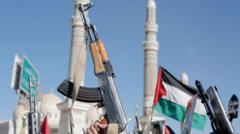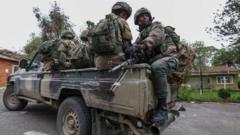In the wake of escalating tensions, the United Nations has announced a suspension of all operations in Yemen's Houthi-held territories following the recent detention of UN personnel in the capital, Sanaa. The organization is actively negotiating for the release of its staff while dealing with a backdrop of ongoing conflict and humanitarian crises.
UN Halts Operations in Houthi-Controlled Yemen After Detentions

UN Halts Operations in Houthi-Controlled Yemen After Detentions
The UN responds to recent detentions of staff in Sanaa, halting all movements in Houthi-controlled regions.
The United Nations (UN) has temporarily halted all operations in areas controlled by the Houthi movement in Yemen after several of its personnel were detained in the capital, Sanaa. This suspension underscores the fragile security situation in Houthi-held regions, where the UN has faced repeated challenges in its humanitarian efforts. The global organization is currently in discussions with senior Houthi officials to secure the prompt release of its detained workers, yet there has been no public response from the Houthis at this time.
This incident is reminiscent of previous occurrences, as the Iranian-backed Houthis have previously detained UN staff, alongside approximately 20 Yemeni employees tied to the US embassy, some held for over three years. Human rights organizations have accused the Houthis of engaging in arbitrary detentions and pervasive abuses against civilians, further complicating the humanitarian crisis in Yemen.
The Houthis have been locked in conflict against a Saudi-led coalition for nearly ten years, with the war erupting after their overthrow of the Yemeni government. While the conflict has been largely stagnant for the past two years, the Houthis have recently attracted renewed scrutiny due to their provocations in the Red Sea and recent hostile actions directed toward Israel, claimed to be in solidarity with Hamas.
International reactions have included military reprisals from the US, UK, and Israel, targeting Houthi positions amid escalating tensions. The Houthis announced a reduction in attacks on maritime vessels and a cessation of rocket fire aimed at Israel following a ceasefire arrangement in Gaza.
As the situation remains dynamic, it reflects the persistent complexities of the Yemen conflict. The war has decimated the nation, which was already the poorest in the Middle East before hostilities began in 2015, leading to catastrophic health and humanitarian crises that have resulted in hundreds of thousands of deaths from violence, starvation, and disease.
UN agencies serve as a critical source of support for millions of Yemenis, yet they frequently confront challenges in delivering humanitarian aid, particularly in remote locations, as Houthi officials have been known to obstruct such efforts.
This incident is reminiscent of previous occurrences, as the Iranian-backed Houthis have previously detained UN staff, alongside approximately 20 Yemeni employees tied to the US embassy, some held for over three years. Human rights organizations have accused the Houthis of engaging in arbitrary detentions and pervasive abuses against civilians, further complicating the humanitarian crisis in Yemen.
The Houthis have been locked in conflict against a Saudi-led coalition for nearly ten years, with the war erupting after their overthrow of the Yemeni government. While the conflict has been largely stagnant for the past two years, the Houthis have recently attracted renewed scrutiny due to their provocations in the Red Sea and recent hostile actions directed toward Israel, claimed to be in solidarity with Hamas.
International reactions have included military reprisals from the US, UK, and Israel, targeting Houthi positions amid escalating tensions. The Houthis announced a reduction in attacks on maritime vessels and a cessation of rocket fire aimed at Israel following a ceasefire arrangement in Gaza.
As the situation remains dynamic, it reflects the persistent complexities of the Yemen conflict. The war has decimated the nation, which was already the poorest in the Middle East before hostilities began in 2015, leading to catastrophic health and humanitarian crises that have resulted in hundreds of thousands of deaths from violence, starvation, and disease.
UN agencies serve as a critical source of support for millions of Yemenis, yet they frequently confront challenges in delivering humanitarian aid, particularly in remote locations, as Houthi officials have been known to obstruct such efforts.





















